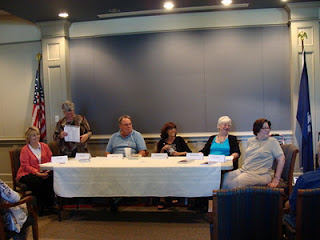 |
| Buy Murder on the Danube |
Last Sunday we were having luncheon with some old friends who were celebrating their wedding anniversary. At my table was their eldest grandson, just out of college with an interest in international business, and no job. I mentioned to him the State Department’s Foreign Service, and the fact that they are hiring new economic officers, following a rigorous set of written and oral exams. His eyes lit up – he had never really considered this career option. Perhaps you have a grandson, or a brother, niece, or son or daughter in college who might be intrigued. My own interest was started by a book on diplomacy that I chanced upon while rummaging through books in our high school library. It looked like a fabulous career. In many respects, it still does.
Have you ever wondered if diplomacy is all glittering Cary Grant or Sean Connery with no down to earth Dennis Farina or Sylvester Stallone? Would you be intrigued by an invitation to an Embassy reception? And have you ever wondered how diplomats are chosen, and what they do?
The classic, cynical answer to the last question was phrased by an English statesman many years ago: “A diplomat is an honest man who is sent abroad to lie for his country.” However, my experience, gleaned from negotiating a treaty with a communist government, is that the farther apart your country is politically from the host government overseas, the greater the need for candor and honesty.
This all comes up because I took the good advice that every writer is given – write about what you know. And my career was in the Foreign Service as a career diplomat, or Foreign Service Officer (FSO).
 |
| Buy Vintage Murder |
My new series of “diplomatic mysteries” explore this world. In the first, “Vintage Murder,” a thirtyish career diplomat, Robbie Cutler, is assigned as Consul in Bordeaux France and Spain Budapest
The diplomatic world is pictured here. Robbie holds a staff meeting in Bordeaux , and participates both in an Embassy conference at Paris Budapest
I suppose at one time, diplomacy was like the elegant popular image. That began to fade in Viet-Nam, when FSOs were assigned out of the Embassy and into the countryside. That is becoming more the norm than the exception, as FSOs in current war-torn areas perform civil affairs work. The days of “The Ugly American,” when diplomats did not speak the local language, are long since past. (That film, by the way, inspired the establishment of our Foreign Service Institute, with intensive training in every conceivable foreign language.)
Don’t worry. There are still glittering Embassy receptions, and Robbie Cutler will find lots of scope for his investigations at his next assignment. And the diplomatic world despite the surface glitter is a very real and perilous one, as Robbie will find out as he climbs the career ladder of diplomacy. Fortunately, his wife will then be able to interpret for him with a keen insight what people are trying to hide. She may even solve a murder or two that he hadn’t suspected!
_________________
About William S. Shepard
Now residents of Maryland ’s Eastern Shore, the Shepards enjoy visits from their daughters and granddaughters, fine and moderate weather, ocean swims at Assateague, Chesapeake Bay crabs, and the company of Rajah and Rani, their two rescued cats.
Prize winning mystery writer William S. Shepard is the creator of a new genre, the diplomatic mystery, whose plots are set in American Embassies overseas. That mirrors Shepard’s own career in the Foreign Service of the United States , during which he served in Singapore , Saigon, Budapest , Athens and Bordeaux , in addition to five Washington
His books explore this rich, insider background into the world of high stakes diplomacy and government. He evokes his last Foreign Service post, Consul General in Bordeaux Hungary France



























